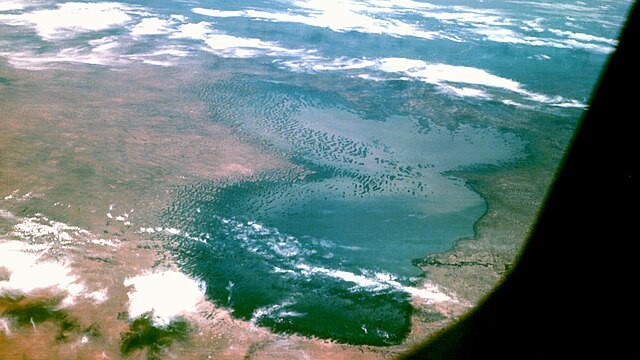By Djimet Issa Mahamat
BOLOM, CHAD — In the shimmering early light, pirogues glide quietly across the placid surface of Lake Chad. For the first time in decades, the water stretches wider, reflecting not just the sky, but a growing sense of optimism in surrounding villages. Fishermen haul in nets with renewed hope. Women draw cleaner water. Birds—once strangers—have returned.
After years of despair over a shrinking shoreline and lost livelihoods, Lake Chad is making a cautious, yet promising comeback, thanks to an unprecedented coalition of local resilience, international cooperation, and science-backed environmental action.
“This water means life,” says Khadidja Oumar, a farmer in the village of Bol. “Without it, we are nothing. Now, we believe again.”
Once Dying, Now Reviving
Once the sixth-largest freshwater lake in the world, Lake Chad has shrunk by nearly 90% since the 1960s, according to the United Nations Environment Programme (UNEP). Decades of drought, mismanagement, and climate change turned much of its basin into cracked earth and contested territory. The receding waterline displaced millions and fueled regional instability.
But in recent years, multinational restoration efforts led by the Lake Chad Basin Commission (LCBC), in partnership with the African Union, the World Bank, and the governments of Chad, Nigeria, Cameroon, and Niger, have started to shift the narrative.
Through a mix of reforestation, community-led watershed management, and transboundary water governance, the basin is gradually rebounding. Satellite imagery from NASA and the African Regional Climate Centre shows modest but consistent increases in seasonal water retention over the last five years (NASA Earth Observatory).
Communities at the Center
The key to these gains lies not in grand infrastructure, but grassroots action. In the Chadian town of Bagasola, youth collectives and women’s groups are replanting native vegetation along the lake’s shores, creating natural barriers to erosion and evaporation.
“We plant trees to protect the water,” says 24-year-old Abakar Mahamat, a local volunteer. “Each root holds the soil. Each tree brings shade. It’s not fast, but it works.”
International NGOs like GIZ and Wetlands International have trained over 3,000 villagers in sustainable agriculture and water harvesting techniques, helping reduce pressure on the lake and regenerate surrounding ecosystems (Wetlands International).
From Crisis to Collaboration
Climate experts long warned that Lake Chad’s decline would become a flashpoint for conflict. And it did. Insecurity from armed groups, including Boko Haram, thrived in the vacuum left by environmental collapse.
Today, restoration is also becoming a platform for peacebuilding. The Great Green Wall initiative, a pan-African reforestation movement, intersects with Chad’s lakefront communities, merging ecological repair with job creation and regional stability (Great Green Wall).
“Environmental cooperation has opened dialogue between once-divided communities,” notes Salamatou Haroun, a conflict resolution specialist working with the LCBC. “The lake gives us not just water, but reasons to work together.”
A Future Fed by Water
In 2021, the World Bank launched the $170 million Lake Chad Region Recovery and Development Project (PROLAC), supporting rural electrification, irrigation systems, and cross-border trade linked to the lake’s recovery (World Bank PROLAC).
Meanwhile, feasibility studies are under way for ambitious water transfer plans from the Congo River Basin—though critics urge caution, noting high costs and potential environmental disruption.
What’s certain is that any sustainable future must be rooted in the basin’s people. From climate-resilient farming to solar-powered water pumps, innovation on the ground is matching high-level strategies.
A Symbol of Survival
To stand at the lake’s edge today is to witness quiet resilience. Cormorants wheel overhead. Fishermen mend nets. Children swim in shallow currents their parents thought long gone.
“Lake Chad is not what it once was,” says Mahamat Djarma, a historian from N’Djamena, “but its story is far from finished. What we restore today, our grandchildren will inherit.”
In a region too often framed by hardship, Lake Chad’s slow return offers a different headline: survival, stewardship, and the enduring power of shared hope.
Sources:


